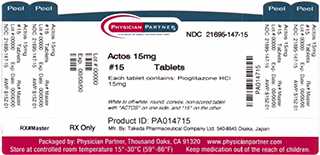![Actos (Pioglitazone) Tablet [Remedyrepack Inc. ] Actos (Pioglitazone) Tablet [Remedyrepack Inc. ]](/wp-content/themes/bootstrap/assets/img/loading2.gif)
•Initiate ACTOS at 15 mg or 30 mg once daily. Limit initial dose to 15 mg once daily in patients with NYHA Class I or II heart failure. (
2.1
)•If there is inadequate glycemic control, the dose can be increased in 15 mg increments up to a maximum of 45 mg once daily. (
2.1
)•The maximum recommended dose of ACTOS is 15 mg once daily in patients taking strong CYP2C8 inhibitors (e.g., gemfibrozil). (
2.3
,
7.1
)•Obtain liver tests before starting ACTOS. If abnormal, use caution when treating with ACTOS, investigate the probable cause, treat (if possible) and follow appropriately. Monitoring liver tests while on ACTOS is not recommended in patients without liver disease. (
5.3
)
ACTOS should be taken once daily and can be taken without regard to meals.
The recommended starting dose for patients without congestive heart failure is 15 mg or 30 mg once daily.
The recommended starting dose for patients with congestive heart failure (NYHA Class I or II) is 15 mg once daily.
The dose can be titrated in increments of 15 mg up to a maximum of 45 mg once daily based on glycemic response as determined by HbA1c.
After initiation of ACTOS or with dose increase, monitor patients carefully for adverse reactions related to fluid retention such as weight gain, edema, and signs and symptoms of congestive heart failure [see Boxed Warning and Warnings and Precautions (5.2)].
Liver tests (serum alanine and aspartate aminotransferases, alkaline phosphatase, and total bilirubin) should be obtained prior to initiating ACTOS. Routine periodic monitoring of liver tests during treatment with ACTOS is not recommended in patients without liver disease. Patients who have liver test abnormalities prior to initiation of ACTOS or who are found to have abnormal liver tests while taking ACTOS should be managed as described under Warnings and Precautions [see Warnings and Precautions (5.3) and Clinical Pharmacology (12.3)].
If hypoglycemia occurs in a patient co-administered ACTOS and an insulin secretagogue (e.g., sulfonylurea), the dose of the insulin secretagogue should be reduced.
If hypoglycemia occurs in a patient co-administered ACTOS and insulin, the dose of insulin should be decreased by 10% to 25%. Further adjustments to the insulin dose should be individualized based on glycemic response.
Coadministration of ACTOS and gemfibrozil, a strong CYP2C8 inhibitor, increases pioglitazone exposure approximately 3-fold. Therefore, the maximum recommended dose of ACTOS is 15 mg daily when used in combination with gemfibrozil or other strong CYP2C8 inhibitors [see Drug Interactions (7.1) and Clinical Pharmacology (12.3)].





![Actos (Pioglitazone Hydrochloride) Tablet [Rebel Distributors Corp.]](http://dailymed.nlm.nih.gov/dailymed/image.cfm?setid=fd156adc-3174-44da-bff7-eeaef5983f18&name=fd156adc-3174-44da-bff7-eeaef5983f18-03.jpg)
![Actos (Pioglitazone Hydrochloride) Tablet [Dispensing Solutions, Inc.]](http://dailymed.nlm.nih.gov/dailymed/image.cfm?setid=b73e5856-e6f5-4239-80d9-fda136c4748b&name=NDC68258-3034-03-----Takeoa.jpg)
![Actos (Pioglitazone Hydrochloride) Tablet [Lake Erie Medical & Surgical Supply Dba Quality Care Products Llc]](http://dailymed.nlm.nih.gov/dailymed/image.cfm?setid=1f93fa66-c086-4811-a9ae-7b76bfafef2b&name=Actos15mgTakeda.jpg)
![Actos (Pioglitazone Hydrochloride) Tablet [Physicians Total Care, Inc.]](http://dailymed.nlm.nih.gov/dailymed/image.cfm?setid=2a97ef74-b338-4655-a60b-923f86720179&name=4343.jpg)
![Actos (Pioglitazone) Tablet [Remedyrepack Inc. ]](http://dailymed.nlm.nih.gov/dailymed/image.cfm?setid=a478354b-1b84-4752-bc6a-aaef7bdc38f7&name=MM3.jpg)
![Actos (Pioglitazone Hydrochloride) Tablet [Cardinal Health]](http://dailymed.nlm.nih.gov/dailymed/image.cfm?setid=730f747a-850d-4a81-89e2-200007a5db5a&name=be0658c3-6b91-4b67-98c3-a580ef560bf8-03.jpg)
![Actos (Pioglitazone) Tablet [Takeda Pharmaceuticals America, Inc.]](http://dailymed.nlm.nih.gov/dailymed/image.cfm?setid=d2ddc491-88a9-4063-9150-443b4fa4330c&name=352f5dd8-4c3e-4e8e-8167-bf383bd95dd6-03.jpg)